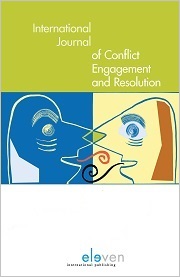|
This article is a personal reflection on the development of the field of conflict resolution/peace and conflict studies from the perspective of the classroom: how what is thought necessary to teach has changed as the field has grown and reacted to often turbulent political change |


International Journal of Conflict Engagement and Resolution
About this journalSubscribe to the email alerts for this journal here to receive notifications when a new issue is at your disposal.
| Editorial |
|
| Authors | Michal Alberstein and Jay Rothman |
| Author's information |
| Article |
|
| Keywords | Conflict and Peace studies, peacebuilding, pedagogy, George Mason University, S-CAR |
| Authors | Kevin Avruch |
| AbstractAuthor's information |
| Article |
|
| Keywords | History of ADR, consensus building, multi-party dispute resolution, theory development, conflict handling |
| Authors | Carrie Menkel-Meadow |
| AbstractAuthor's information |
|
This article reviews the historical contingency of theory and practice in conflict engagement. World War II and the Cold War produced adversarial, distributive, competitive, and scarce resources conceptions of negotiation and conflict resolution, as evidenced by game theory and negotiation practice. More recent and more optimistic theory and practice has focused on party needs and interests and hopes for more party-tailored, contingent, flexible, participatory and more integrative and creative solutions for more than two disputants to a conflict. The current challenges of our present history are explored: continued conflict in both domestic and international settings, the challenge of “scaling up” conflict resolution theory and the problematics of developing universal theory in highly contextualized and diverse sets of conflict sites. The limits of “rationality” in conflict resolution is explored where feelings and ethical, religious and other values may be just as important in conflict engagement and handling. |
| Article |
|
| Keywords | Radical disagreement, linguistic intractability, agonistic dialogue, conflict engagement |
| Authors | Oliver Ramsbotham |
| AbstractAuthor's information |
|
This article concerns linguistic intractability, the verbal aspect of those conflicts that so far cannot be settled or transformed. At its heart lies the phenomenon of radical disagreement. This is generally discounted in conflict resolution as positional or adversarial debate. It is seen as a terminus to dialogue that must from the outset be transformed, not learnt from. In this article the refusal to take radical disagreement seriously is traced back to the way radical disagreement is described and explained in the third party theories that frame attempts at settlement and resolution in the first place. |
| Article |
|
| Keywords | Reflective practice, conflict resolution, professional education, community of inquiry, expertise |
| Authors | Tamra Pearson d’Estrée |
| AbstractAuthor's information |
|
Conflict resolution has obtained the markings of a profession, including published journals, professional associations and academic programs. However, professional status also carries with it expectations and obligations upon which conflict resolution as a community should deliberate. Acknowledging conflict resolution as a profession highlights associated responsibilities around knowledge accumulation and ethical practice. Complexities of modern practice call for reuniting theory, research and practice, and updating our professional educational paradigm. Competent modern conflict resolution professionals must be able to innovate and adapt to novel and complex contexts, and must develop communities of inquiry for learning that is public, shared and cumulative. Because of the time constraints facing many professionals, and the lack of structure for reflection, a combination of direct community conversation and periodic journal review would likely be the most realistic for nurturing the needed reflection, continual learning and paradigm critique that results in system learning by the community of conflict resolution professionals. |
| Article |
|
| Keywords | Conflict resolution, peace, evidence-based practice, gender, systems |
| Authors | Peter T. Coleman |
| AbstractAuthor's information |
|
The news from the field of peace and conflict studies is mixed. It is evident that the increasing complexity, interdependence and technological sophistication of conflict, violence and war today introduce many new challenges to peace-keeping, making and building. However, it is also likely that these trends present new opportunities for fostering and sustaining peace. If our field is to capitalize on such prospects, it will need to more effectively understand and address several basic dilemmas inherent to how we approach our work. This paper outlines six contemporary challenges, and suggests some options for addressing them. |
| Article |
|
| Keywords | Conflict transformation, conflict resolution, action research, positioning theory, relational constructionism |
| Authors | Nikki R. Slocum-Bradley |
| AbstractAuthor's information |
|
This article draws upon relational constructionist ideas to facilitate a meta-theoretical shift in conflict engagement and transformation. Based upon insight into conceptual and relational inter-dependency, two tasks are suggested as key aims for future work: 1) nurturing a profound respect for inter-dependent self/other and appreciation for relationships, and 2) developing skills to construct nurturing, generative relationships. Underscoring that research, theory-building and other aspects of scholarship are in themselves practices, the author encourages the design of these and other practices to facilitate conflict transformation. Exploring the implications of relational constructionist insights, an approach is proposed that merges the boundaries of theory-building, research methodology, and conflict engagement: Action Research for the Transformation of Conflicts (ART-C). While ART-C provides a process that facilitates the construction of cooperative relationships, insights from Positioning Theory illuminate how actors co-construct relationships by evoking meanings and norms that guide action. These concepts are applied to a variety of examples from around the globe that illustrate the transformation of identities, relationships and conflicts. |

 Issue 2
Issue 2